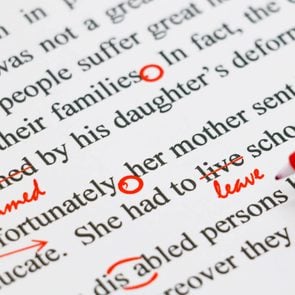“Elicit” vs. “Illicit”: What’s the Difference?
Updated: May 09, 2023

Understanding elicit vs. illicit can be complicated—they sound similar but have entirely different meanings. Here's what you need to know.
When we work hard on a professional project, we hope our efforts will elicit enthusiasm from co-workers. On the other hand, if someone is secretly embezzling from the company, that’s an illicit action likely to have serious legal consequences. Sure, these words sound a lot alike, but their meanings are drastically different. And when comparing elicit vs. illicit, you don’t want to choose the wrong one.
Some homophones (words that sound exactly alike but have different spellings and definitions) can be difficult to master—discreet vs. discrete and stationary vs. stationery come to mind. There is some debate as to whether elicit and illicit are homophones, but it just boils down to who is speaking. Technically, the e in elicit could be pronounced like the e in eat or each, while the i in illicit is pronounced like the i in chill, drill or, yes, ill. But elicit and illicit are both spoken with emphasis on the second syllable; therefore, the opening vowel sound goes by so fast that you’re not likely to hear a difference.
The English language throws us plenty of curveballs—think flush out vs. flesh out, burnt vs. burned, envy vs. jealousy. And when it comes to elicit vs. illicit, both are standard (but not interchangeable) words, so getting them mixed up is a mistake spellcheck likely won’t catch. If you don’t want to add elicit or illicit to the list of possible words you’re using wrong (like home in vs. hone in, loose vs. lose or historic vs. historical), we’re here to help.
What does elicit mean?
Elicit is a verb (an action word) meaning to draw out information or a potential response. The word’s roots are in the Latin word elicere, which includes the verb lacere (“to entice by charm or attraction”). When you think about elicit vs. illicit, keep in mind that they are different parts of speech—elicit is the only verb. That means mixing them up could be a grammar mistake that makes you look bad.
Examples of elicit in a sentence
- Judy’s proposal that all employees get a paid day off for their birthday elicited widespread support.
- When Liz brought her rescue dog to the office on Take Your Dog to Work Day, the pup elicited a warm response.
- Kim’s plan to visit New York City elicited enthusiasm from her friends who live there.
What does illicit mean?
Illicit is an adjective meaning not permitted, unlawful or immoral. It’s used much more often than its opposite, licit, which means permissible. And just as illicit is never a verb, elicit would never be used as an adjective. Unlike cancelled vs. canceled, which can be used interchangeably, these two words are not synonyms.
Examples of illicit in a sentence
- The teenagers were secretive about their illicit drinking of beer.
- If you feel compelled to check your partner’s phone for illicit text messages, your relationship might need help.
- As we said at the beginning of this article, illicit financial activities at work will get you fired.
Tricks for remembering elicit vs. illicit
Want to keep things straight with elicit vs. illicit? An easy way to do so is to use word associations, specifically for illicit. This word has the same first letters as illegal—and a good number of illicit actions are also illegal. Even when an illicit behavior is not illegal, it may be bad for your well-being—in other words, it may make you feel ill. Similarly, elicit and evoke both start with the letter e, which might be helpful when remembering this verb.
We know there can be a lot of confusing grammar rules to keep track of. But if you keep these tips in mind, you’ll breeze through any elicit vs. illicit issues you have—eliciting respect for your spelling prowess along the way.
Elicit vs. illicit: Test your knowledge!
Sources:
- Merriam-Webster: “Elicit”
- Merriam-Webster: “Illicit”





















